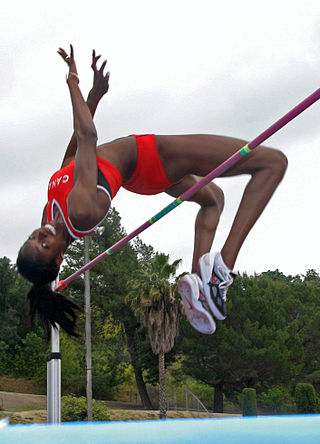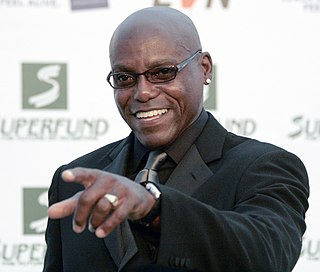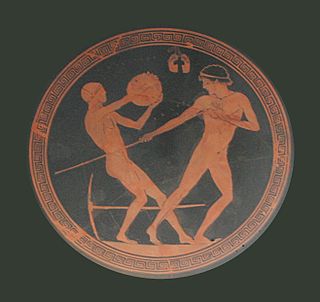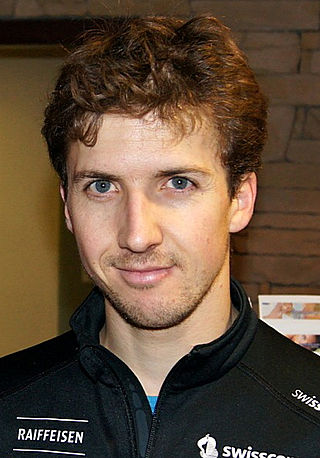
The high jump is a track and field event in which competitors must jump unaided over a horizontal bar placed at measured heights without dislodging it. In its modern, most-practiced format, a bar is placed between two standards with a crash mat for landing. Since ancient times, competitors have introduced increasingly effective techniques to arrive at the current form, and the current universally preferred method is the Fosbury Flop, in which athletes run towards the bar and leap head first with their back to the bar.

The long jump is a track and field event in which athletes combine speed, strength and agility in an attempt to leap as far as possible from a takeoff point. Along with the triple jump, the two events that measure jumping for distance as a group are referred to as the "horizontal jumps". This event has a history in the ancient Olympic Games and has been a modern Olympic event for men since the first Olympics in 1896 and for women since 1948.

Skiing is the use of skis to glide on snow. Variations of purpose include basic transport, a recreational activity, or a competitive winter sport. Many types of competitive skiing events are recognized by the International Olympic Committee (IOC), and the International Ski Federation (FIS).

The triple jump, sometimes referred to as the hop, step and jump or the hop, skip and jump, is a track and field event, similar to long jump. As a group, the two events are referred to as the "horizontal jumps". The competitor runs down the track and performs a hop, a bound and then a jump into the sand pit. The triple jump was inspired by the ancient Olympic Games and has been a modern Olympics event since the Games' inception in 1896.

Nordic combined is a winter sport in which athletes compete in cross-country skiing and ski jumping. The Nordic combined at the Winter Olympics has been held since the first ever Winter Olympics in 1924, while the FIS Nordic Combined World Cup has been held since 1983. Many Nordic combined competitions use the Gundersen method, where placement in the ski jumping segment results in time (dis)advantages added to the contestant's total in the cross-country skiing segment.

Ski jumping is a winter sport in which competitors aim to achieve the farthest jump after sliding down on their skis from a specially designed curved ramp. Along with jump length, competitor's aerial style and other factors also affect the final score. Ski jumping was first contested in Norway in the late 19th century, and later spread through Europe and North America in the early 20th century. Along with cross-country skiing, it constitutes the traditional group of Nordic skiing disciplines.

Frederick Carlton Lewis is an American former track and field athlete who won nine Olympic gold medals, one Olympic silver medal, and 10 World Championships medals, including eight gold. His career spanned from 1979 to 1996, when he last won an Olympic event. He is one of only six Olympic athletes who won a gold medal in the same individual event in four consecutive Olympic Games.

The 1980 Summer Olympics, officially known as the Games of the XXII Olympiad and commonly known as Moscow 1980, were an international multi-sport event held from 19 July to 3 August 1980 in Moscow, Soviet Union, in present-day Russia. The games were the first to be staged in an Eastern Bloc country, as well as the first Olympic Games and only Summer Olympics to be held in a Slavic language-speaking country. They were also the only Summer Olympic Games to be held in a self-proclaimed communist country until the 2008 Summer Olympics held in China. These were the final Olympic Games under the IOC Presidency of Michael Morris, 3rd Baron Killanin before he was succeeded by Juan Antonio Samaranch, a Spaniard, shortly afterwards.

Track and field is a sport that includes athletic contests based on running, jumping, and throwing skills. The name is derived from where the sport takes place, a running track and a grass field for the throwing and some of the jumping events. Track and field is categorized under the umbrella sport of athletics, which also includes road running, cross country running and racewalking.

A pentathlon is a contest featuring five events. The name is derived from Greek: combining the words pente (five) and -athlon (competition). The first pentathlon was documented in Ancient Greece and was part of the Ancient Olympic Games. Five events were contested over one day for the Ancient Olympic pentathlon, starting with the long jump, javelin throwing, and discus throwing, followed by the stadion and wrestling. Pentathletes were considered to be among the most skilled athletes, and their training was often part of military service—each of the five events in the pentathlon was thought to be useful in war or battle.
A heptathlon is a track and field combined events contest made up of seven events. The name derives from the Greek επτά and ἄθλος. A competitor in a heptathlon is referred to as a heptathlete.

Simon Ammann is a Swiss ski jumper. He is one of the most successful athletes in the history of the sport, having won four individual Winter Olympic gold medals in 2002 and 2010. His other achievements include winning the 2007 Ski Jumping World Championships, the 2010 Ski Flying World Championships, the 2010 Nordic Tournament, and the 2010 Ski Jumping World Cup overall title.

The events of the equestrian at the 2004 Summer Olympics featured three equestrian disciplines: dressage, eventing and jumping. All three disciplines are further divided into individual and team contests for a total of six events.

The FIS Nordic World Ski Championships is a biennial Nordic skiing event organized by the International Ski Federation (FIS). The World Championships was started in 1925 for men and opened for women's participation in 1954. World Championship events include Nordic skiing's three disciplines: cross-country skiing, ski jumping, and Nordic combined. From 1924 to 1939, the World Championships were held every year, including the Winter Olympics. After World War II, the World Championships were held every four years from 1950 to 1982. Since 1985, the World Championships have been held in odd-numbered years.

Equestrian sports were first included in the Olympic Games in the Summer Olympics of 1900 in Paris. They were again included in 1912, and have been included in every subsequent edition of the Games. The Olympic equestrian disciplines are dressage, eventing, and show-jumping. In each discipline, both individual and team medals are awarded. Women and men compete on equal terms.
At the 1968 Summer Olympics in Mexico City, 36 athletics events were contested, 24 for men and 12 for women. There were a total number of 1031 participating athletes from 93 countries.

Norway competed at the 2002 Winter Olympics in Salt Lake City, United States. The nation enjoyed its best ever results in gold medals, most notably in the biathlon events, when Ole Einar Bjørndalen swept all four gold medals.

The steeplechase is an obstacle race in athletics, which derives its name from the steeplechase in horse racing. The foremost version of the event is the 3000 metres steeplechase. The 2000 metres steeplechase is the next most common distance. A 1000 metres steeplechase is occasionally used in youth athletics.

The high jump at the Summer Olympics is grouped among the four track and field jumping events held at the multi-sport event. The men's high jump has been present on the Olympic athletics programme since the first Summer Olympics in 1896. The women's high jump was one of five events to feature on the first women's athletics programme in 1928, and it was the only jumping event available to women until 1948, when the long jump was permitted.
















